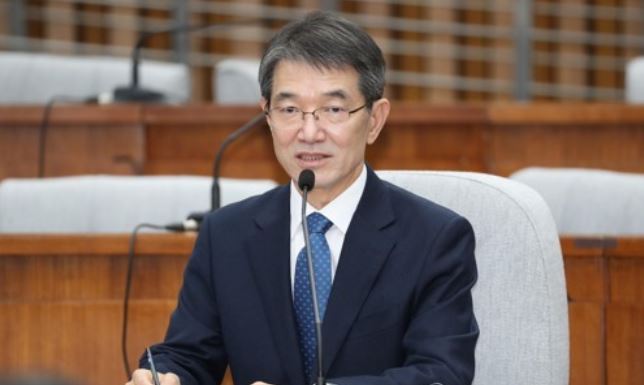Supreme Court nominee pledges fair trials for socially weak
By YonhapPublished : Dec. 19, 2017 - 15:57
Supreme Court Justice nominee Ahn Chul-sang vowed Tuesday that he would pursue aboveboard rulings to protect the socially disadvantaged and shore up public trust in the judiciary if appointed.
During a parliamentary confirmation hearing, Ahn, currently the Daejeon District Court chief, also highlighted the need to root out the courts' allegedly favorable treatment of former judges and prosecutors, which have long been blamed for corruption in the legal circles.
"The protection of minorities and the socially disadvantaged can be a process of balancing the scale tiled against these people.... I believe the role of the judiciary lies right there," Ahn said during his opening remarks.
"The protection of the socially weak is not to give them special benefits that are not written in the law but to recover their inherent rights that are stipulated in the law," he added.

To show his longstanding commitment to protecting the rights of the socially marginalized, Ahn catalogued a history of his rulings in favor of them. One of them concerned a naturalized foreign-born spouse on the verge of losing her citizenship.
Ahn said that his advocacy for the socially disadvantaged stems from his personal experience.
"My father passed away when I was a high school student, and due to my family's financial conditions, I had difficulty advancing into the tertiary education," he recalled. "It was a tough period, but this experience helped me understand the socially weak."
The nominee then highlighted the importance of "objective, fair" trials to enhance public trust in courts. He also said that the legal process should be speedy to ensure that low-income citizens are not put at a disadvantage due to lengthy, costly litigation procedures.
During the hearing, Ahn came under fire for his children's use of fake addresses in the 1990s to send them to schools of their choice. He acknowledged it and apologized.
Asked about whether the death penalty should be abolished, he said that the capital punishment has to be "considerably" restricted as any misjudgment cannot be reversed.
On the issue of those refusing to carry out their mandatory military duty based on their religious beliefs, the nominee threw his support behind the idea of allowing them to carry out alternative services.
Ahn's appointment requires consent from a majority of lawmakers present during a floor vote that can be set up by a majority of all 299 legislators. The ruling Democratic Party with only 121 seats is far short of a majority, necessitating opposition support. (Yonhap)





![[Grace Kao] Hybe vs. Ador: Inspiration, imitation and plagiarism](http://res.heraldm.com/phpwas/restmb_idxmake.php?idx=644&simg=/content/image/2024/04/28/20240428050220_0.jpg&u=)
![[Herald Interview] Mom’s Touch seeks to replicate success in Japan](http://res.heraldm.com/phpwas/restmb_idxmake.php?idx=644&simg=/content/image/2024/04/29/20240429050568_0.jpg&u=)


![[News Focus] Lee tells Yoon that he has governed without political dialogue](http://res.heraldm.com/phpwas/restmb_idxmake.php?idx=644&simg=/content/image/2024/04/29/20240429050696_0.jpg&u=20240429210658)









![[Today’s K-pop] Seventeen sets sales record with best-of album](http://res.heraldm.com/phpwas/restmb_idxmake.php?idx=642&simg=/content/image/2024/04/30/20240430050818_0.jpg&u=)